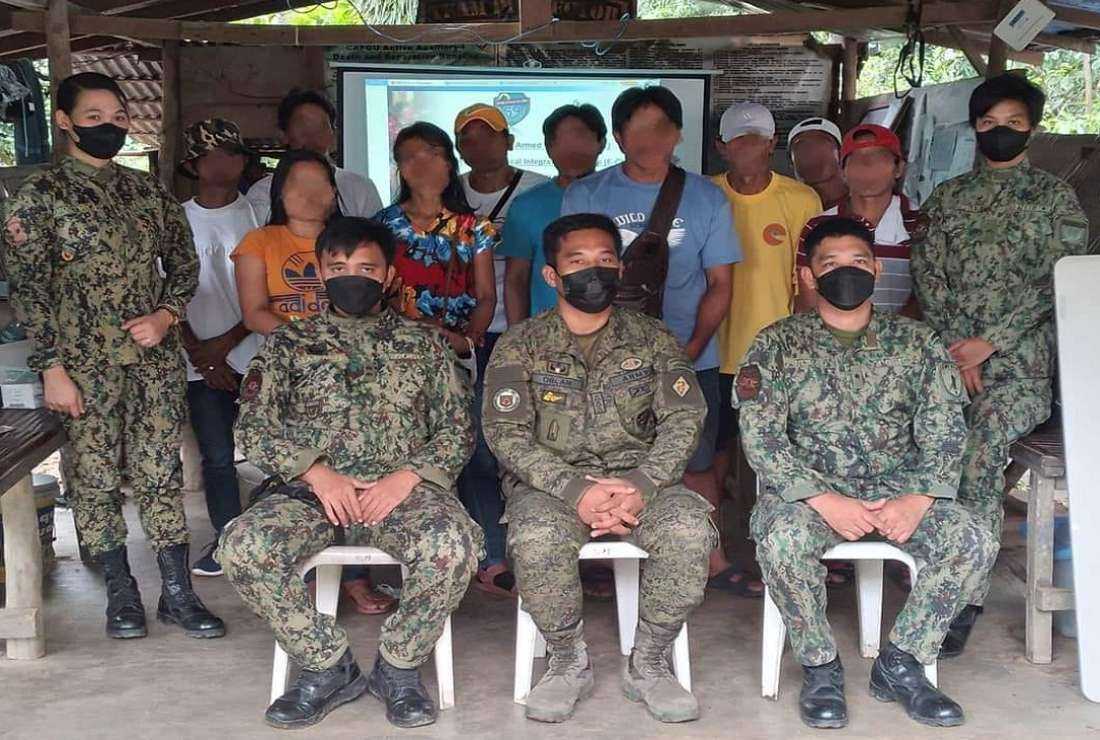
Former members of Abu Sayyaf surrendered to military forces in Sulu province, Mindanao region. (Photo: Philippine Army)
More than 150 members of a Muslim extremist group surrendered to Philippine military authorities in the Mindanao region on Nov. 8.
Members of the Abu Sayyaf group, officially known as the Islamic State-East Asia Province, surrendered at a military camp in Jolo, Sulu province, turning over their firearms and ammunition.
Military officials said the surrender was the outcome of their repeated and uninterrupted offense against the rebels.
“We have engaged in offensive attacks as we are pursuing them for the crimes they had committed in the past. Several of their high-ranking officials have arrest warrants and we are implementing the law to bring them to justice,” Maj. Gen. Ignatius Patrimonio, commander of the Joint Task Force Sulu, told reporters on Nov. 8.
The rebels had cited “fatigue” as their reason for surrendering, saying they had been fighting government forces without food and water, as well as a lack of ammunition.
“I would say many of them had come to their senses like they are already missing a comfortable life down the mountains. They do not even have potable water or decent food. So rather than risk being killed, they had surrendered to live,” Patrimonio added.
President Ferdinand Marcos, Jr. lauded the military for the “effectivity” of their campaign against the terrorist group.
“I would like to congratulate our armed forces for a job well done. The true measure of our offensive attack is not in the number of rebels neutralized but the number of those who surrendered – a manifestation that there is a change in their principles and ideology,” Marcos, Jr. told reporters on Nov. 9.
Philippine Muslim scholar Gandula Maitem, however, said the Mindanao conflict is far from over, especially if people in the region remain poor.
“Poverty feeds terrorism. Poverty fuels terrorism. They are attracted to join terrorist groups because of a lack of education. They lack education because many, if not most of them, did not step into schools due to extreme poverty. So, they had a very different outlook in life,” Maitem told UCA News.
The Department of Social Welfare and Development (DSWD) said the rebels would undergo a rehabilitation program while serving time in prison.
“They were members of the terrorist group. Thus, they need to undergo a government rehabilitation program before they could be reintegrated into society,” DSWD secretary Erwin Tulfo told reporters on Nov. 8.
Tulfo said part of the rehab program was to require them to attend religious Islamic classes to teach them the importance of peace.
“We have Muslim imams who will explain to them that religion should not be weaponized to spread fear much more to hurt the innocent. This was not the teaching of Allah. Islam is for peace,” Tulfo added.
Since January, more than 174 Abu Sayyaf members have surrendered to government forces in various military detachments in Sulu province due to a continuous military offensive ordered by former Philippine President Rodrigo Duterte.
Duterte, after passing the controversial Anti-Terrorism Law, labeled the group “terrorists” while granting himself the power to order military forces to bomb purported camps in the mountains of Sulu province.
Abu Sayyaf has been described as "rooted in a distinct class made up of closely-knit networks built through the marriage of important families through socioeconomic backgrounds and family structures," according to Islamist expert and English anthropologist Michael Buehler.
The group has carried out numerous bombings, kidnappings, assassinations and extortion activities in the Philippines including the abduction and beheading of several American Protestant missionaries in 2000 and 2001.


